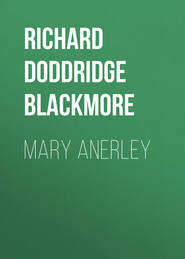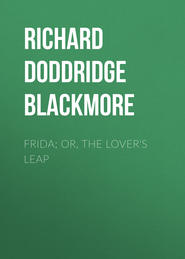По всем вопросам обращайтесь на: info@litportal.ru
(©) 2003-2024.
✖
Fringilla
Настройки чтения
Размер шрифта
Высота строк
Поля
And singing soft, above them bending,
A song herself had made.
VIII
In evening's calm, she walked between
The tints and shades of rich delight,
While overhead came, arching green,
Many a shrub and parasite,
To crown their Queen;
There laughed the joy of the rose, among
Myrtle and Iris, heaven's eye,
Magnole, with cups of moonlight hung,
And Fuchsia's sunny chandlery,
And coral tongue;
And where the shy brook fluttered through,
Nepenthe held her chalice leaf
(Undrained as yet by human grief),
And broad Nymphaea grew.
IX
But where the path bent towards the wood,
Across it hung a sombre screen,
The deadly night-shade, leaden-hued;
And there behind it, darkly seen,
A Being stood:
The form, if any form it had,
Was likest to a nightly vision
In mantle of amazement clad,
A terror-sense, without precision,
Of something bad.
A tremble chilled the forest shade,
A roving lion turned and fled,
The birds cowered home in hush of dread;
But Eve was not afraid.
X
She stood before him, sweetly bold,
To keep him from her garden shrine,
With hair that fell, a shower of gold,
Around her figure's snowy line
And rosy mould:
He (with a re-awakened sense
Of goodness, long for ever lost,
And angel beauty's pure defence)
Shrank back, unable to accost
Such innocence:
But envy soon scoffed down his shame;
And with a smile, designed for fawning,
But like hell's daybreak sickly dawning,
His crafty accents came.
XI
"Sweet ignorance, 'tis sad and hard
To break thy fond confiding spell;
And my soft heart hath such regard
For thine, that I will never tell
What may be spared."
He turned aside, o'erwhelmed with pain,
And drew a sigh of deep compassion:
She trembled, flushed, and gazed again,
And prayed him quick, in woman's fashion,
To speak it plain:
"Then, if thou must be taught to grieve,
And scorn the guile thou hast adored—
The man who calls himself thy lord,
Where goes he, every eve?"
XII
"Nay, then," she cried, "if that be all,
I care not what thou hast to say;
The guile that lurks therein is small—
My husband but retires to pray,
At evening call."
"To pray? Oh yes, and on his knees
May-hap to find a lovely being:
Devotions so devout as these
Are best at night, with no one seeing,
Among the trees."
She blushed as deep as modesty,
Then glancing back as bright as cride,
"What woman can he find,' she cried,
"In all the world, but me?"
XIII
A song herself had made.
VIII
In evening's calm, she walked between
The tints and shades of rich delight,
While overhead came, arching green,
Many a shrub and parasite,
To crown their Queen;
There laughed the joy of the rose, among
Myrtle and Iris, heaven's eye,
Magnole, with cups of moonlight hung,
And Fuchsia's sunny chandlery,
And coral tongue;
And where the shy brook fluttered through,
Nepenthe held her chalice leaf
(Undrained as yet by human grief),
And broad Nymphaea grew.
IX
But where the path bent towards the wood,
Across it hung a sombre screen,
The deadly night-shade, leaden-hued;
And there behind it, darkly seen,
A Being stood:
The form, if any form it had,
Was likest to a nightly vision
In mantle of amazement clad,
A terror-sense, without precision,
Of something bad.
A tremble chilled the forest shade,
A roving lion turned and fled,
The birds cowered home in hush of dread;
But Eve was not afraid.
X
She stood before him, sweetly bold,
To keep him from her garden shrine,
With hair that fell, a shower of gold,
Around her figure's snowy line
And rosy mould:
He (with a re-awakened sense
Of goodness, long for ever lost,
And angel beauty's pure defence)
Shrank back, unable to accost
Such innocence:
But envy soon scoffed down his shame;
And with a smile, designed for fawning,
But like hell's daybreak sickly dawning,
His crafty accents came.
XI
"Sweet ignorance, 'tis sad and hard
To break thy fond confiding spell;
And my soft heart hath such regard
For thine, that I will never tell
What may be spared."
He turned aside, o'erwhelmed with pain,
And drew a sigh of deep compassion:
She trembled, flushed, and gazed again,
And prayed him quick, in woman's fashion,
To speak it plain:
"Then, if thou must be taught to grieve,
And scorn the guile thou hast adored—
The man who calls himself thy lord,
Where goes he, every eve?"
XII
"Nay, then," she cried, "if that be all,
I care not what thou hast to say;
The guile that lurks therein is small—
My husband but retires to pray,
At evening call."
"To pray? Oh yes, and on his knees
May-hap to find a lovely being:
Devotions so devout as these
Are best at night, with no one seeing,
Among the trees."
She blushed as deep as modesty,
Then glancing back as bright as cride,
"What woman can he find,' she cried,
"In all the world, but me?"
XIII











